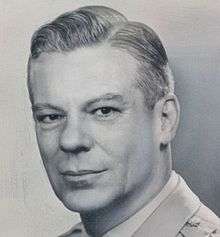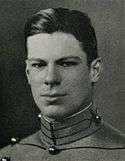John Honeycutt Hinrichs
| John Honeycutt Hinrichs | |
|---|---|
 Hinrichs as Chief of Ordnance, 1958 | |
| Born |
July 10, 1904 Sandy Hook, New Jersey |
| Died |
February 13, 1990 (aged 85) Monterey, California |
| Allegiance |
|
| Service/branch |
|
| Years of service | 1928–1962 |
| Rank |
|
| Commands held | United States Army Ordnance Corps |
| Battles/wars | World War II |
| Awards |
Distinguished Service Medal Legion of Merit Bronze Star |
John H. Hinrichs (July 10, 1904—February 13, 1990) was a United States Army Lieutenant General. He was most prominent for his service as Chief of Ordnance.
Early life

John Honeycutt Hinrichs was born at Sandy Hook Proving Ground in Sandy Hook, New Jersey on July 10, 1904 to Frederic William Hinrichs, Jr and Mary Honeycutt-Hinrichs. He was raised in California. His father and grandfather, John Thomas Honeycutt, were both graduates of the United States Military Academy, West Point.[1][2] His brother, Lt. Frederic W. Hinrichs, III, was a pilot in the US Navy Reserve and died in an airplane crash during World War II.[3]
In 1928 he graduated from the United States Military Academy.[4][5]
Start of career
Hinrichs was initially assigned to the Field Artillery branch.[6]
In 1932 he received a bachelor of science degree in mechanical engineering from the Massachusetts Institute of Technology.[7]
In 1935 he transferred from Artillery to the Ordnance Corps.[8]
Hinrichs graduated from the Army Industrial College in 1937.[9]
Hinrichs served in numerous Ordnance assignments in the United States and overseas, including a posting to Frankford Arsenal and command of the Twin Cities Ordnance Plant.[10][11][12]
World War II
From 1943 to 1945 Hinrichs was executive officer (second in command) of the Maintenance Division in the Ordnance Department's Field Service Office. In this position he was responsible for improving equipment and weapons readiness by analyzing data to identify systemic causes for breakdowns and repairs, and developing solutions to minimize the time these items were non-mission capable.[13]
Later career
In the late 1940s Hinrichs served as Ordnance Officer for U.S. Army Forces, Middle Pacific.[14]
In 1948 Hinrichs graduated from the National War College.[15]
From the early to mid-1950s Hinrichs was head of the Field Service Division.[16][17]
From 1955 to 1958 Hinrichs was Deputy Chief of Ordnance.[18][19]
From 1958 until his 1962 retirement Hinrichs was the Army's Chief of Ordnance. He was promoted to Lieutenant General in 1959.[20][21][22][23]
Awards and decorations
Hinrichs' decorations included the Distinguished Service Medal for service from September 1955 to May 1962, Legion of Merit for service from 1943 to 1945 and the Bronze Star Medal.[24][25]
In 1978, Hinrichs was inducted in the Ordnance Corps Association's Hall of Fame.[26]
Retirement and death
Hinrichs was the Army's last Chief of Ordnance until the position was reinstituted again 20 years later. The Chief of Ordnance billet was abolished upon his retirement as the result of a plan to reorganize and streamline the Army's command and staff structure. The position was instituted again in 1983.[27][28][29]
In 1962 Hinrichs had been announced as the first head of a new Supply and Maintenance Command. In April, 1962 he gave Congressional testimony defending Nike Zeus Missile contractors against charges of excessive profiteering on previous projects.[30] As a result of the controversy over whether the contractors were being overpaid, and because he opposed the reorganization, Hinrichs opted to retire.[31][32]
Hinrichs died in Carmel, California on February 13, 1990.[33][34][35]
References
- ↑ "Genealogical Succession, Graduates of the United States Military Academy". West Point Association of Graduates. February 2011. pp. 3–5.
- ↑ "Official Register of Officers and Cadets". United States Military Academy. 1922. p. 89.
- ↑ "Frederic W. Hinrichs, Jr. 1902 Memorial". West Point Association of Graduates. Retrieved 4 April 2015.
- ↑ "Biography, John Honeycutt Hinrichs". 1928 Yearbook for United States Military Academy. US Military academy: 184. 1928.
- ↑ "General Hinrichs to Visit Gallup". Independent. Gallup, New Mexico. January 15, 1954.
- ↑ "Hinrichs of Pasadena Heads Army Ordnance". Independent. Pasadena. March 22, 1958.
- ↑ "President selects Besson, Daley, Hinrichs to Head Army's New R&D Commands". Army Research and Development magazine. 3–4: 9. 1962.
- ↑ "Detailed to other arms and services" (PDF). The Field Artillery Journal. U.S. Army Field Artillery Association. 25 (January–February): 86. 1935.
- ↑ "Active List". Official U.S. Army Register. U.S. Army Adjutant General: 245. 1961.
- ↑ "(Need article title)". Ordnance magazine. American Ordnance Association. 19-20: 111. 1939.
- ↑ Twin Cities Ordnance Plant Bulletin (PDF). National Archives and Records Administration. April 1, 1942. p. 2 and 6.
- ↑ Anfinson, John O. (December 18, 1992). "War in the Heartland: The St. Paul District". Builders & Fighters - U.S. Army Engineers in World War II (PDF). p. 249. Archived from the original (PDF) on July 24, 2009.
- ↑ "(Missing article title)". Army Ordnance magazine. American Ordnance Association. 30-31: 240. 1946.
- ↑ Report, Investigation of the National Defense Program, published by United States Senate Special Committee Investigating the National Defense Program, 1947, page 19663
- ↑ "Active List". Official U.S. Army register. U.S. Army Adjutant General: 339. 1954.
- ↑ "General Visits Herlong Depot". Reno Gazette. March 24, 1952.
- ↑ "General Palmer Touring Com Z". Stars and Stripes Newspaper, Europe, Mediterranean, and North Africa Edition. June 5, 1954.
- ↑ "Ordnance Deputy to Tour Europe". Stars and Stripes Newspaper, Europe, Mediterranean, and North Africa Edition. September 12, 1957.
- ↑ "Pasadenan Head of Army Ordnance". Star-News. Pasadena, California. March 21, 1958.
- ↑ Associated Press (March 20, 1958). "New Chief of Army Ordnance Appointed". Oakland Tribune.
- ↑ "Inventory, Records of the Office of the Chief of Ordnance". National Archives and Records Administration, (Record Group 156), 1797–1969,. Retrieved November 27, 2011.
- ↑ United Press International (August 8, 1959). "3d Star Asked for 4 Generals". Stars and Stripes Newspaper, Europe, Mediterranean, and North Africa Edition.
- ↑ Morgensen, Andy (June 15, 1960). "Army Receives First Model of A-War Troop Carrier". Oakland Tribune.
- ↑ "Awards page for John H. Hinrichs". Military Times Hall of Valor web site. Retrieved November 27, 2011.
- ↑ "Active List". Official Army Register. U.S. Army Adjutant General: 309. 1951.
- ↑ "Hall of Fame Inductees by Year page". U.S. Army Ordnance Corps Association web site. Retrieved November 27, 2011.
- ↑ Hoffman, Fred S. (January 17, 1962). "Streamlined Army Goal of Kennedy". Morning Herald. Hagerstown, Maryland. Associated Press.
- ↑ "Kennedy Relaxing With His Family". Pharos-Tribune. Logansport, Indiana. United Press International. April 23, 1962.
- ↑ "Biography page, Maj. Gen. William E. Potts". U.S. Army Ordnance Association web site. Retrieved November 27, 2011.
- ↑ "(Missing article title)". Army magazine. Association of the United States Army. 12: 54. 1961.
- ↑ "General Defends Contractor in Probe of Missile profits". Record. Troy, New York. United Press International. April 18, 1962.
- ↑ "Review Honors Gen. Hinrichs". Baltimore Sun. May 5, 1962.
- ↑ Social Security Death Index, entry for John Honeycutt Hinrichs, accessed November 27, 2011
- ↑ California Death Index, 1940–1997, entry for John Honeycutt Hinrichs, accessed November 27, 2011
- ↑ U.S., Department of Veterans Affairs BIRLS Death File, 1850–2010, entry for John H. Hinrichs, accessed November 27, 2011